I was five years old when I stepped on a stage for the first time. And while I didn’t know it at the time, my love of performing would follow me my whole life, turning from a hobby to a passion to a career.
Theater has acted as many things for me. It has been my greatest joy and greatest stress. But throughout my entire life, theatre has been a guidepost. It has taught me the value of hard work, the importance of working as a team, and gave me the courage to take up space and speak in front of a crowd.
While theater is a career for me, these other hard skills can be applied in pretty much every scenario. That is why arts education is absolutely crucial in standard K-12 education.

An article published in the Harvard Graduate School of Education Magazine details the story of a student, inspired to pursue writing after taking a high school theater class. The arts program at South Boston High School used to be thriving, but little of it remains due to budget cuts.
Time and time again–the importance of arts education has been reiterated by professionals.
The No Child Left Behind act of 2001 details the arts as a core academic subject.
A more recent report written by a Commission on the Arts through the American Academy of Arts and Sciences, entitled Art for Life’s Sake: The Case for Arts Education, further proves the necessity of arts in school curricula.
The report makes a case for arts as a core requirement and emphasizes the importance of a fully funded arts program in public education. It states that art teaches skills such as developing an understanding of other cultures, building empathy, and social- emotional development. The importance of these skills cannot be understated, even in other fields such as the sciences.
Despite the obvious importance of arts curricula, programs around the United States are in crisis. When budget cuts are made, arts are frequently the first to go.
Schools should prioritize art as they prioritize other subjects. Art, when taught in conjunction with other subjects, creates well rounded individuals with skills that assist them in and out of the classroom.























































